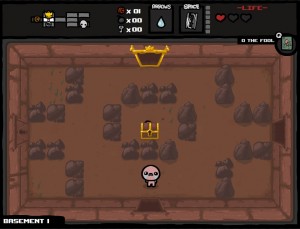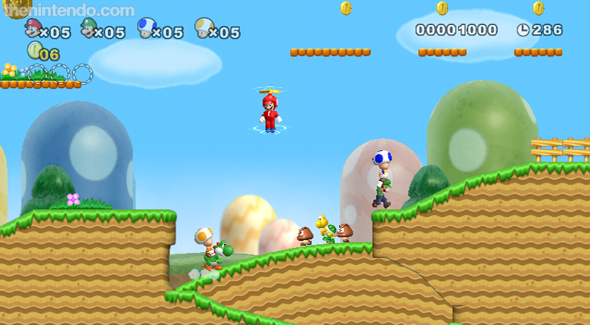[Enjoy this guest post from frequent contributor Richard Rosenbaum! – Ed.]
Video games have been accused of promoting a wide variety of social ills: violence, misogyny, drug abuse, consumerism; the list goes on and on. One thing the medium hasn’t been blamed for, though, is religion (Spiritual Warfare notwithstanding). However, it could be argued that, far from being the devil’s way of enticing young minds to commit diabolical acts and scuff up their immortal souls, video games are in fact a Creationist plot to trick gamers into believing in God.
Don’t see the connection? Read on.
Does Mario Believe in Miyamoto?
Let’s say you’re an Italian-American plumber: you work hard, you’re close with your brother, probably you were raised Catholic. Your name is Mario. You find yourself in the magical Mushroom Kingdom, constantly besieged by a despotic , fire-breathing turtle, and you’re the only one capable of restoring freedom to the peace-loving fungi of this beautiful land.
Then this happens:
http://www.youtube.com/watch?v=wBasfwkdSS4
Later, once you’ve finished saving the world and rescuing the princess, you and your brother Luigi are sitting around having a few beers and discussing your most recent adventures.
“It was incredible,” you say. “I mean, if anything had been just a little different – if those question blocks hadn’t been exactly where they were, or if there hadn’t been those Piranha Plants and that Propeller Cap inside but, let’s say, a Fire Flower instead, I’d never have been able to get those star coins! Everything was arranged so perfectly, so precisely. It really makes you think it was all put there on purpose, you know? Like it was designed.”
Luigi, ever the skeptic, replies: “But if things weren’t the way that they are, they’d just be some other way instead. Maybe in that case you’d be raving about how unlikely that was. Or you wouldn’t have known there was any star coin there at all and you would have just kept on going.”
The argument Mario and Luigi are having here is what’s known in philosophy as the Anthropic Principle. In one certain formulation, the Anthropic Principle puts forth the idea that the laws of the universe and the particular circumstances of our place in it seem so precisely modeled to bring about the necessary conditions for intelligent life – so fine-tuned that if any one element had been just a little different it would be impossible for human beings to exist – that it indicates a Creator who intentionally made things this way in order to bring us about in the way that we are. Basically, it’s an argument for the existence of God. That’s what Mario is proposing and it’s often referred to as the Strong Anthropic Principle. Luigi’s point is that the appearance of design is no proof of design, because if things were different enough that we couldn’t exist to observe them, we wouldn’t be around to notice. So we don’t exist “on purpose,” but since the universe happens to be the way that it is, it just happens to be possible that we exist too.
Variations on the Anthropic Principle as an argument for God’s existence vary from the ridiculous to the sublime. Remember Kirk Cameron demolishing atheism by appealing to the humble banana (ignoring that the modern banana is more or less the product of centuries of human engineering)? On the other side of the coin, there’s Benjamin Franklin’s often-misquoted statement: “Behold the rain which descends from heaven upon our vineyards, there it enters the roots of the vines, to be changed into wine, a constant proof that God loves us, and loves to see us happy.”

Co-conspirators.
The difference is that Kirk Cameron and Ben Franklin are making observations from within Creation and then trying to reason their way out of it – something that 18th Century Idealist philosopher and notoriously punctual celibate Immanuel Kant warns us not to do, though philosophers engage in that kind of thing constantly and, according to Kant, to the discipline’s detriment. All knowledge, he says, is based on experience; since we necessarily can have no experience of anything outside of our physical world (such as its hypothetical Creator), we can’t ever know anything about what’s beyond it – what Kant calls the Noumenal – no matter how good our reasoning.
So Mario and Luigi can debate theology until the Koopa Kids come home, but they can’t ever come to any certain conclusion because they can’t look past the screen – they’re trapped within their own perceptual world. We, on the other hand, sitting smugly on the other side of the Nintendo, know that Mario is actually correct. There is a designer (or, more accurately, a whole pantheon of them), that created the Mushroom Kingdom and everything in it, including the Super Mario Brothers themselves, and organized elements such that certain really cool stuff like getting star coins in elaborate ways should be possible.
From a philosophical perspective, the whole thing smacks of Creationism. On a subtle level, the structure of the game suggests that the complex arrangement of the gameworld – and by extension, worlds in general – is too perfect to be a coincidence; that it had to have been put there on purpose by an intelligent agent. What we may have here is a decades-old conspiracy of programmers, indoctrinating the youth to find design in every event, intention in every object.
Let’s look at some other games to see if more evidence of this Creationist plot can be uncovered.
Will Wright, Who Art In Heaven
In Spore, from Will Wright, creator of such addictive ego-trips as Sim City and The Sims, you take control of the evolution of your very own species – from microscopic organism all the way to technologically advanced, galaxy-colonizing sentience. Hailed in some quarters as a potential teaching tool for science, others criticized it – the evolutionary process in the first two stages of Spore bears little resemblance to currently accepted biology. In fact, Spore looks a lot more like Intelligent Design: The Video Game.
Spore avoids the biogenesis – or origin of life – problem by appealing to the panspermia hypothesis, which sounds like the title of a pornographic parody episode of The Big Bang Theory but actually isn’t (yet). The idea is that the basic building blocks of life on Earth arrived here billions of years ago from elsewhere in the galaxy, probably via meteorite impact. At the moment, this is as viable an explanation as any, considering that the other major hypothesis is that life arose spontaneously out of a so-called “primordial soup” – plausible enough but not technically a proper scientific theory, since there’s not yet any evidence that such a soup existed. Spore takes the safer route by pushing off the origin of life question – it came from outer space! – but leaves its earliest beginnings mysterious.
In the first part of Spore, the Tide Pool Stage, your creature begins its life as a microscopic organism in a game mode that’s sort of a hybrid of Pac-Man and Asteroids. Pac-teroids, if you will. Your little blob cruises around for a while trying to avoid things bigger than itself and eat things smaller than itself. Based on what it eats it gets “DNA points,” which you can spend between generations to make evolutionary upgrades to your species: add eyes, legs, mouths, shells or claws, and so on.
This, needless to say, is not what your high school biology textbook will tell you (unless you live in Texas). While Spore could be arguing for a Lamarckian view of evolution rather than a purely Darwinian one, with leaps in physiology from one generation to the next, the huge degree of personal agency involved in the development of your creature in Spore is suspiciously teleological. This is no Blind Watchmaker at work; this is a goal-driven process, the result of conscious decisions made by a higher power – namely, you – toward a desired outcome – the emergence of a conscious being.
Now, on one level, making an evolution simulator where the player just sits there and watches as mindless physical forces and arbitrary environmental conditions lead to the emergence of a species that survives by being successfully adapted to its surroundings – that would just be bad, boring game design. But on an ideological level, even if Spore isn’t trying to advocate for the intentional guidance of the development of life on this planet, it certainly seems to make a good case for the plausibility of Intelligent Design in principle. That is, Spore’s evolutionary mechanism doesn’t accord with the facts of world as it’s currently understood, but it does show how something like Intelligent Design could function under certain circumstances. It’s subtle, nearly subliminal, but it’s definitely there.
“Why On Earth Can’t You Get Ye Flask?”
The Point-and-Click Adventure was a genre that enjoyed its height of popularity in the late 1980s and early 1990s with games like the King’s Quest series and Day of the Tentacle. It’s now mostly been supplanted by games with better graphics and more immersive interfaces, but Telltale Games in particular still specializes in the form with games like the Sam & Max series, the new Back To The Future games, and Strong Bad’s Cool Game For Attractive People (“but you can play it too!”).
One of the main reasons for the Point-and-Click’s decline is the common frustration the player experiences when trying to do something with something they’re not supposed to, or when unable to figure out what to do at all. In a P&C there’s a finite number of obtainable items in the world and limited combinations of or uses for items that will actually do anything. The trick is getting the right items and then doing the right things with them to accomplish the task at hand and progress to the next puzzle.

From left to right: Sam, Max.
The P&C gameworld is one in which there’s a place for everything, and your job is to put everything in its place. Meaning that each object you encounter is there for a reason, and has its own utility and purpose that will go unfulfilled until you activate it with your human agency. The player character in such a game could reasonably come to the conclusion that not only will everything in the world with which it’s possible to interact, at some point, be absolutely vital to solving some problem, but also that, conversely, every problem that comes up will be solvable using only the objects that you have with you. Nothing is useless, and no problem is ever totally inextricable. In other words: there is always hope. Given enough time and the capacity for philosophical reflection, Sam and/or Max could come to believe that everything in their world has been provided by some powerful external force, some being that knows all their needs and provides the conditions for their satisfaction ahead of time. And Sam and/or Max would be right. Their world was created, and it was created just for them.
Isaac Unbound?
But surely not all popular video games submit so transparently to the Anthropic Principle?
Well, no. Let’s take The Binding of Isaac, an indie game modeled after the original NES Legend of Zelda – except you’re a naked toddler in Hell, your sole weapon your own projectile tears. Our friends over at Video Games Hot Dog had a discussion a while back about this game and how frustrating certain aspects of its gameplay can be – specifically that you can be thrown into a dungeon with blocked-off areas or locked doors but no possible way to access them, no ability to obtain enough bombs or keys to penetrate these obstacles. That’s because The Binding of Isaac incorporates Roguelike elements into its game design.
A Roguelike (named for the prototype of the genre, Rogue) uses randomly generated dungeons and randomly occurring items to create and populate its play space, so the size, shape, and contents of each level is inherently unpredictable. Thus you can be tossed into a basement with no keys, but every room might have a locked treasure chest in it. Maybe you’ll get a key from killing a monster and maybe you won’t. Chances are good that you’ll be forced to go through the level without any possibility of getting all the powerups contained therein.
You could argue that this element makes the game unfair and needlessly annoying. How hard would it have been for the game designer to make it so that there were never more locked chests or blocked areas surrounded by rocks than there were keys or bombs? But we’re also always complaining that life isn’t fair in exactly the same way, aren’t we? And if life isn’t fair, why should video games be? If any game character had reasons to doubt the existence of a Creator it would be poor little Isaac.

What kind of a God would allow this?
Except.
As you might have already guessed from its Bible-referencing title, Binding of Isaac is a game absolutely steeped in religion. Not just in its allusions and themes, but its very storyline hinges on overt revelation from God Himself, pacts with the devil, and powerups both diabolical and holy. The Deity is all over this game; as if to emphasize or punctuate the apparent arbitrariness of certain gameworld elements, that sense of being a tiny, scared creature that can’t possibly even begin to comprehend the external Powers at whose mercy he is, every pixel positively marinates in theology like the oozing blood of a sacrificed ram. Despite all that evident injustice, there’s no room for doubts: Isaac knows there’s a Creator, even if he doesn’t know why the Creator has made it so that Isaac has to submit to so much suffering.
Because of its randomization, The Binding of Isaac is extremely replayable, and rewards multiple playthroughs with extra content, unlockable achievements, new playable characters, new bosses, and so on. There are bonuses for completing the game not just once, but up to ten times. But get this: the achievement you unlock following your sixth complete playthrough is called “Everything’s Terrible.” You finish the game for the sixth time and – congraturation! – “the game,” the game itself informs you, “just got harder.”
Now, what kind of a reward is that? Actually, it’s just the kind of reward you’d expect from a game created by … well, created by a Creator. The designer of Binding of Isaac made this game by drawing from his experiences growing up in a heavily religious household, and if he knows anything about religion it’s that the point of it isn’t to make life easier; it makes life more difficult, imposing rules and restrictions that may feel arbitrary but the comportment with which alleges to make success all the more meaningful. The Binding of Isaac is a meaningful game, and also a deeply metaphysical one. Its randomness, its ever-increasing difficulty, its ostensible unjustness, all belie a more fundamental primary architecture below the surface, an orderliness that introduces chaos on purpose so the player will be continually surprised and challenged, and therefore will remain motivated to keep going.
So basically, yes, video games are kind of a Creationist plot after all. There is at least one documented case of a person becoming a theist after playing Final Fantasy VII. But in what way could it be otherwise? After all, it’s impossible by definition to create something that has no Creator. Does that make secular art a contradiction in terms? It’s a fact that the human mind is inherently configured to see order and purpose where they may not exist. But is that tendency in us a result of mere adaptation – or intention?
[Could God create a level so tough that even he couldn’t beat it? Or have we stared so long into the bottomless pit that the pit has stared back into us? Sound off in the comments! – Ed.]

Richard Rosenbaum is a writer from Toronto who edits fiction for The Incongruous Quarterly and Broken Pencil. He wrote a story about a punk band called The Oughts, which you can get from Found Press for just ninety nine cents (if you’re into that kind of thing).
Mario does strike me as a theist, now that you mention it.
I’ve always heard this issue as the argument from design, and the anthropic principle being something else (more along the lines of we’re here, so the universe we see is one that allows us to exist, not that it’s the only possible one).
There’s a very interesting comic I saw on reddit related to this a while back http://english.bouletcorp.com/2011/12/18/pixel-quantum/
“…the universe we see is one that allows us to exist, not that it’s the only possible one.”
Intriguing concept. The possibility of universes that WOULDN’T allow us to exist gives rise to the thought of what DOES exists there and is disallowed here.
Is it weird that this is the first thing I thought of after reading the title? Skip to 4:08. Oh, yes, I went there.
http://www.youtube.com/watch?v=ubBN38hL9KY
Back to the matter at hand, if the player is positioned behind the curtain or in the heavenly sphere of creators outside of the “perceptual world of Mario and Luigi” then “in a way” aren’t most forms a media an attempt to prove the theory of Creationism? Whether it’s a book, TV show, or film, the audience is constantly being positioned outside of the universe of the show. When we step back and treat the property analytically, it’s always going to seem like things worked out a certain way because the writers ordained it as such.
Question: What about when things don’t work out the right way? I don’t play video games but I know enough to know that if you don’t get the key or the coin or whatever it is you need to move to the next level then you pretty much fail. So what is this saying? If the world has been designed in a very exact way, does this eliminate free will? Does it mean, that for people to succeed, they must first assess the world and figure out what they have been designed to accomplish and focus all their energy on that task or risk failure at, well, life?
The Sims strikes me as similar to the Morningdale scandal in Never Let Me Go by Kazuo Ishiguro. Perhaps it is just that we’re projecting something that seems scary/controversial in our world into a space where it is no longer threatening or controversial.
So saying religion makes life more difficult to make it more meaningful, taking that to the cosmic scale is to say that a more difficult cosmic condition where there is no Creator that watches over us and protects us makes life and every human creation and observation that much more meaningful. I like it but there’s a pride to it because it puts humans conveniently at the top, I probably prefer the 2001 scenario where there’s more intelligent beings and it could be interpreted as the universe still being creator-less, but we’re still in the top 5.
But with the Mario scenario, I like to imagine them as humans first then randomly turning into digital going into a perfect world than randomly going back right when and where the left, that that would happen randomly is far more awesome than if it happened by design.
Isaac lives in his delusional world.(not his chamber, the underground nightmare underneath) You can see him drawing it.
And all incarnations are disguises.
(sorry for bad english)
(reposting as it would appear my previous post did not get through, if this is a repost, the moderators should feel free to delete this one)
I had a similar thought when I, after a few years of philosophy studies took a computer programming class. Whereas in the “real world” I remain a committed nominalist/nonessentialist, it was as if I had suddenly discovered a new man-made universe in which something very much like the Platonist theory of Forms was true, a world full of timeless ideal archetypes waiting to be, however imperfectly, instantiated in the temporary world of the program being written.
For that matter, I have to agree with cat’s comment that all man-made texts (and I use the word “text” in the borderline-ridiculously inclusive literary theory-sense here) are similarly covertly creationist in that they are, more or less by definition, the deliberate creations of a conscious intelligence. What is worth taking into account here is the sense of relief we feel as we enter these artificial (both in the sense of being artefacts, and the sense of being “unreal”), indisputably Created universes. as their order and purpose are obviously intelligible and accessible to us (and this not merely as an article of religious faith, but as the result of practical, empirical discovery). One of the more obvious examples of this is perhaps the classic detective story, that we enjoy in the full knowledge not only that the criminal will eventually be caught, but that the universe is set up in such a way as to make their* capture the result of a rational examination of the clues available.
On this note it is also worth to mention J L Borges’ deservedly famous short story “Tlön, Uqbar, Orbis Tertius” (full text available here), in which the artificial, man-made world of Tlön eventually replaces ours, as”(e)nchanted by its rigour, humanity forgets over and again that it is a rigour of chess masters, not of angels”, which is to say, an order intelligible to humans.
_________
*”they” being by far the best gender neutral singular pronoun, to refer back to an earlier OTI discussion.
I found the discussion of Sam & Max particularly interesting because of the statement “Nothing is useless”. In Telltale’s Sam & Max games, there is one useless object. During an episode I found particularly challenging, you find a typewriter ribbon lying on the ground, and absolutely nothing can be done with it. The characters even comment “It’s useless.” Naturally I assumed this to be a lie, and whenever I got stuck on a puzzle, I took to rubbing that damnable ribbon against every interactable object I could find: nothing ever came of it.
This would seem to violate the idea of a perfectly designed universe for them; except the nature of the ribbon is eventually revealed. In the next episode, in a scene involving time travel, Sam & Max solve a puzzle, and afterwards we are treated to a several second scene that serves only to show us that Sam & Max themselves accidentally caused the ribbon to end up in the place they found it in the previous episode.
I think this adds a very interesting layer to the idea of a designed universe: It isn’t merely perfectly designed for Sam & Max, but when they deviate from the design by allowing a typewriter ribbon to end up on the wrong side of a time portal, their actions only serve to ruin the design’s perfection by introducing a useless object.
I find it more chilling than cat’s idea that a design eliminates free will. Rather, Telltale’s universe is already perfect, meaning the only changes that can be made will worsen the universe. Sam & Max have free will, but exerting it can only bring them pain.